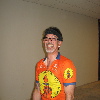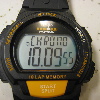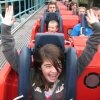I think it’s time to say again, “This is great!”
 |
 |
It’s Tuesday, and that means stair practice at the Aon building in downtown L.A. As always, I rode the train there, and as always, I was dreading it all the way there.
I got to the building and signed in. Then I went to the stair entrance on the 4th floor to get ready. I had decided that I was going to try to be more conscious of the steps today, and try to see how much larger the mechanical floor are, as compared to regular office floors. I figured that would give me something else to think about besides, “What the HELL was I thinking coming here and doing this again.”
This building was built in the early ’70s, and the steps are 7.5 inches each. Regular office floors have 22 steps between them. For most of the building, these are in the form of two 11-step stairways with a landing and 180-degree turn between them. I’ve worked out how to do the ‘one foot on the landing’ turns, so each 11-step flight is basically six footfalls, twelve for one floor. And I noticed that that means that if I start off with my right foot, the fact that it’s an even number of footfalls per floor means that I’ll always be starting off on my right foot. But because it’s two flights, each with an odd number of steps, there’s double steps, with one single at the end of each flight. And it worked out that the single step was always on the same leg. In practical terms, that means that of the 22 steps I have to lift my body for each floor, one leg is doing 12 of them, and the other leg is doing 10. And that difference adds up after 10 or 20 floors. So I figured out to do a little stutter-step about every five floors, so that I’d switch which leg was leading and having to do more work. This may have helped even out the load on each leg. In any event, it kept my mind occupied and thinking about something other than how much all this stair climbing hurts.
I also noticed one other thing about this. The middle portion of the building, from 24 to 41 is a bit different. There are still 22 steps per floor, but they are divided up with 10 steps, a landing with a 90-degree left turn, three steps, another landing, and then 9 steps up to the next floor. So the landings on the floors are big, and there’s no way to do a pivot turn. You pretty much have to take an extra step. But because it’s easy to do double steps with 90-degree turns, it ends up being the same 12 footfalls for each floor. But one of those footfalls is a non-climbing one on the big landing. And so you end up with 11 climbing steps per floor, six on one leg, and five on the other. And if you don’t do a stutter-step every few floors, one leg is doing significantly more work than the other. And that’s bad for business.
The other thing I wanted to pay attention to was the mechanical floors. These are where they keep the elevator motors, air conditioning blowers, and other such things. I’ve always had a sense that these floors are a little taller than regular floors. So I counted steps when I got to the first one at 20. And it turned out that from 20 to 24, the floors were 24 steps apart. That’s not a huge difference, but it is a little bit more. And the mechanical floors from 41 to 45 were also 24 steps each.
The top of the practice climb is at 60, and I stumbled out of the stairwell and flopped down on the floor. I was very pleased to see that my time was 10:10, which is a full 8 seconds faster than my previous best time.
After recovering for a bit, I walked up the stairs the rest of the way to the roof door, just to see how many steps there were. It was 24 steps to 61, and 28 to 62. Then there were 10 steps more to the roof door. After that, there’s just the last flight up to the roof, and I didn’t open the door to count them, since the guards at the building have been very nice to us, and I don’t want to cause trouble. But that last flight is probably something like 12 or 16 steps.
And that’s my report from the stairwell. Back to you in the studio…

